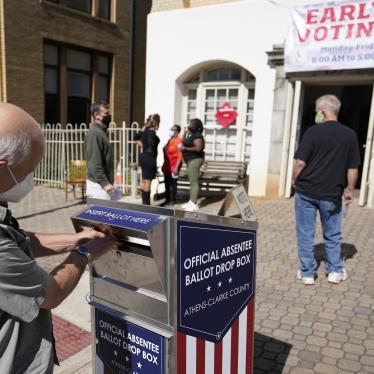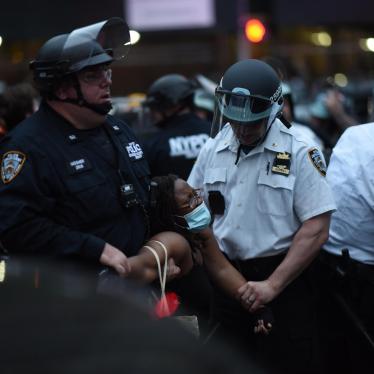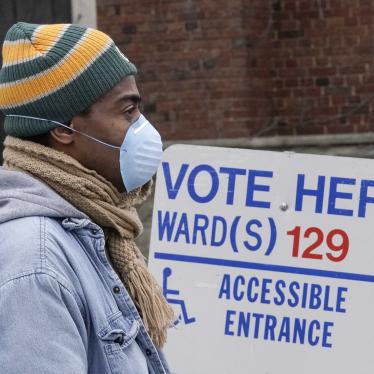As leaders at an international human rights organization, we prepared for the chance that the US election would go precipitously, dangerously off the rails. We worried about an indeterminate result, attacks by violent extremists, brutal police or military responses to demonstrators, and election administration problems similar to those that plagued the primaries and disenfranchised voters in several states.
Instead, in large part due to the tireless efforts of grassroots advocates and local election officials, we are able to say with certainty that a record number of voters engaged in the electoral process. Their choice of Joe Biden for president and Kamala Harris for vice president was recorded in a credible manner without widespread election violence or intimidation.
Given his pre-election statements and long history of disparaging the democratic process, it’s no surprise that President Donald Trump has refused to acknowledge this result – and, though dangerous, his fraudulent claims of victory are ultimately immaterial to the transfer of power in January, particularly now that the General Services Administration has allowed the transition to proceed. Instead of an immediate crisis, what we are facing is an attack on the most fundamental principle of democracy, that voters pick leaders—leaders do not pick and choose which voices to heed and which to silence.
Over 70 years ago, a NAACP petition to the United Nations urged the UN to push the US to ensure redress for human rights violations committed against Black citizens, describing a “series of laws, methods of administration, court decisions and general public policy” that openly deprived Black Americans of the right to vote. The petition, entitled “An Appeal to the World,” pointed out that the disenfranchisement of Black Americans made “all democracy in the nation difficult.”
These words still ring true. Like the late civil and human rights hero, Representative John Lewis, who embodied a commitment to democratic ideals, so too do the thousands of local election officials and poll workers who labored tirelessly to adapt election procedures to the unique challenges of a global pandemic to deliver what international observers have called a “competitive and well-managed” process. Trump’s baseless lawsuits can’t succeed in court because these officials did their job–regardless of political party—and upheld democratic institutions.
But how long can these institutions hold up to antidemocratic assaults? The answer will depend on the commitment the US government demonstrates to a human rights agenda that will improve respect for the rights of the entire population. US voters should be an inspiration. They showed a deep commitment to participating in their democracy by turning out in record numbers, even while contending with structural racism, apathy, poverty, exhaustion and a mismanaged pandemic. As an election observer and Marquette University professor Robert Smith told us, the 2020 elections were “a moment of amazing courage.” Imagine how much more vibrant US democracy could be if government responded to that courage by effectively fulfilling fundamental human rights.
We see in our work around the world that autocracies thrive on disinformation, scapegoating and fear, but they rarely solve the problems that they cite to justify their rise to power. In the US, the Covid-19 pandemic has exacted a terrible toll, and in the run-up to the election it exposed ways in which Trump’s government was failing to address—and deepening—fundamental social inequities. A human rights agenda is about providing solutions to the real problems that put wind in the sails of antidemocratic leaders so that they can no longer point to social and economic dislocations to justify their abusive actions.
And it’s not only here at home that the US election matters. Those acting to subvert the will of the people in this election are not only tarnishing the reputation of the United States, they are offering autocrats new excuses to behave similarly. How much moral force can anyone ascribe to the US State Department’s recent statements on elections in Tanzania, the Ivory Coast, or Myanmar when the US secretary of state claims, without evidence, that January will bring a “transition to a second Trump administration”?
Trump and his enablers should stop undermining democracy and partisans who want to maintain any connection to democratic ideals should speak out against overturning the will of the people. But this moment underscores even more crucially that the Biden administration and the incoming Congress have an enormous responsibility to focus on fundamental rights at home and abroad, address the ravages of the Covid-19 pandemic, poverty and inequality, and rebuild US democracy.









